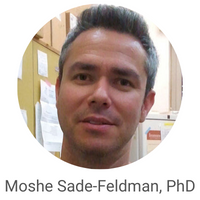NewsOct | 28 | 2022
Research Spotlight: Learning More About Neutrophil Involvement in Severe COVID- 19

Moshe Sade-Feldman, PhD, an instructor in investigation at the Center for Cancer Research and an instructor in Medicine at Harvard Medical School, is the senior author of a new study in Cell Reports Medicine, Longitudinal Characterization of Circulating Neutrophils Uncovers Distinct Phenotypes Associated with Severity in Hospitalized COVID-19 Patients.
What Question Were You Investigating?
What are the mechanisms of neutrophil involvement in severe COVID-19 and their association with clinical outcomes?
Until our work, neutrophils were understudied at a large scale, as analyses of COVID-19 patient samples mostly focused on peripheral blood mononuclear cells (PBMCs).
In our work, we presented a longitudinal study of a large cohort of hospitalized COVID-19 patients (n=384) that combines unbiased, bulk RNA-seq transcriptomic analysis of enriched blood neutrophils with plasma proteomics, cfDNA measurements, and high-throughput antibody profiling in order to understand neutrophil dynamics during the immune response to SARS-CoV-2 infection.
What Were the Results?
Our study allowed us to identify the relationships between neutrophil states and patient outcome, and find that specific granulocyte subsets, especially G-MDSCs, were associated with severe disease while others (e.g., neutrophil progenitors) with mild disease.
The G-MDSC signature was also the best early (Day 0) predictor of outcome, even compared to all the clinical variables.
A key finding of our paper was that neutrophil activation was associated and likely driven by the proportions of immunoglobulin isotypes.
We observed that intubated patients started with higher spike-specific IgA1:IgG1 ratios (Day 0) and patients that died maintained this high ratio, while patients who survived developed higher IgG1:IgA1 ratios later in disease.
We then showed in vitro that:
(1) purified IgA antibodies from COVID-19 patients triggered NETosis;
(2) IgG antibodies (in complex with SARS-CoV-2 spike protein) triggered neutrophil phagocytosis and reactive oxygen species generation.
What are the Clinical Implications?
Our findings can help provide the rational for developing therapeutic modalities, targeting specific neutrophil populations and/or their function with the potential to aid with disease resolution in severe cases of COVID-19.
Paper Cited:
LaSalle, T. J., Gonye, A., Freeman, S. S., Kaplonek, P., Gushterova, I., Kays, K. R., Manakongtreecheep, K., Tantivit, J., Rojas-Lopez, M., Russo, B. C., Sharma, N., Thomas, M. F., Lavin-Parsons, K. M., Lilly, B. M., Mckaig, B. N., Charland, N. C., Khanna, H. K., Lodenstein, C. L., Margolin, J. D., Blaum, E. M., … Sade-Feldman, M. (2022). Longitudinal characterization of circulating neutrophils uncovers phenotypes associated with severity in hospitalized COVID-19 patients. Cell reports. Medicine, 3(10), 100779. https://doi.org/10.1016/j.xcrm.2022.100779
About the Massachusetts General Hospital
Massachusetts General Hospital, founded in 1811, is the original and largest teaching hospital of Harvard Medical School. The Mass General Research Institute conducts the largest hospital-based research program in the nation, In July 2022, Mass General was named #8 in the U.S. News & World Report list of "America’s Best Hospitals."
Type
Centers and Departments
Topics
Check out the Mass General Research Institute blog
Bench Press highlights the groundbreaking research and boundary-pushing scientists working to improve human health and fight disease.
Support Research at Mass General
Your gift helps fund groundbreaking research aimed at understanding, treating and preventing human disease.
